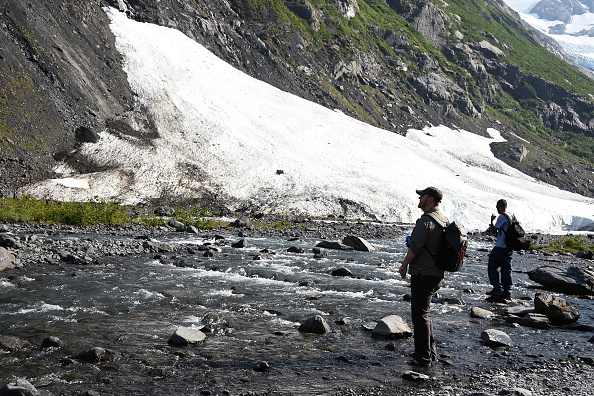The frozen north isn’t so frozen any more. They’re having a heat wave — in Alaska.
In fact, reports the Washington Post, not a single Alaskan weather station, nearly 300 of them, has “recorded a temperature below freezing since June 28 — the longest such streak in at least 100 years.”
“It’s the hottest summer we’ve had, ever,” Steve Perrins told the Post. Perrins has worked at the state’s oldest hunting lodge, more than 100 miles northwest of Anchorage, since 1977.
“On Independence Day, the temperature at Ted Stevens Anchorage International Airport hit 90 degrees for the first time on record,” the Post says, adding that “Alaska, which logged its warmest June on record, now seems destined to register not only its warmest July but also its warmest month.”
High temperatures inevitably lead to wildfires: more than 2 million acres have burned so far this year — not a record yet, but headed that way.
Sea ice around Alaska is at record lows in some places, and that’s affecting native species like seabirds, seals and even fish and other sea creatures.
“In Nome, Pacific cod have been showing up in crab nets. They used to be extremely rare in the North Bering Sea,” says Alaska climate specialist Rick Thoman. “Meanwhile, salmon have been reportedly dying, suffocating as water temperatures climb and less dissolved oxygen remains in the water.”
On land, in south-central Alaska, “residents face a different outlook: streams that are running high because snow and glaciers are melting quickly,” the Post says.
And it’s not just Alaska.
“The entire Arctic is suffering under extreme temperatures,” the Post says. “In Siberia, sweeping wildfires are sending smoke thousands of miles away and lofting dark soot particles onto the vulnerable Arctic ice cover. Arctic sea ice is melting at an alarming pace and could break the 2012 record.
“In addition, the weather system that caused last week’s heat wave in Western Europe has now settled above the Atlantic side of the Arctic, accelerating surface-ice melting in Greenland.”
Ominously for the rest of the world, the heat is generating more greenhouse gases.
“Much of northern and central Alaska is covered by permanently frozen soil known as permafrost. When this icy soil melts, the organic matter within it decomposes and releases long-buried stores of greenhouse gases, including carbon dioxide and methane,” the Post says. “This, in turn, speeds up global warming.”



